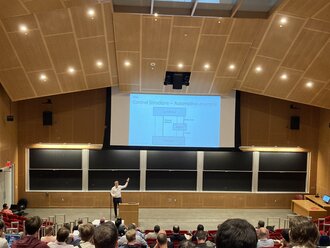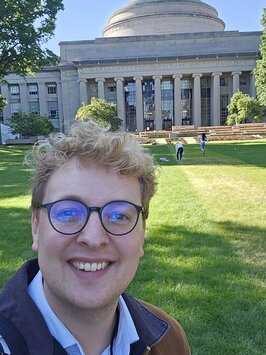
Security & Safety Engineering and Risk, Reliability and Safety Engineering graduate presents thesis at MIT
For me, American student life is a myth. Numerous films and series painted a picture of immense pressure to perform coupled with a thriving party life. I only knew universities like Harvard, Stanford or the Massachusetts Institute of Technology (MIT) from movies. I would never have believed that I would one day be able to present the results of my thesis at one of these universities myself.
My journey began in February 2023, when I came across the world of STPA (Systems Theoretic Process Analysis) and STAMP (System-Theoretic Accident Model and Processes) while looking for a topic for my thesis.
STAMP is a new accident causation model based on systems theory and systems thinking that addresses critical challenges in the areas of systems engineering, safety and cyber security. This way of thinking was developed at M I T by the renowned Professor Nancy Leveson. Applications of STAMP span complex software, human decision making and human factors, new technologies, social and organisational design, and security culture. STAMP is described by its developers as a “true paradigm shift”. It is a novel way of approaching problems with which system vulnerabilities can be identified more quickly and comprehensively than with traditional methods. The core of my master's thesis was to find a way to combine the existing standards for functional safety (ISO 26262) and cybersecurity (ISO 21434) with the use of the new STAMP way of thinking. In the months that followed, I worked intensively with STAMP and used it as part of my final thesis in the field of safety engineering in the automotive industry at msg Plaut in Vienna.
As part of my master's thesis, I developed a procedure for standard-compliant risk assessment using STAMP. This means that the advantages of STAMP can be used in car development while at the same time complying with the standards required for approval.
Through my supervisor in Vienna, Florian Wagner, I then learned about a congress called STAMP Workshop, which is organised by M I T on site in Boston and deals with results, problems and applications of STAMP in industry and science. In spring 2024, I applied to speak at the STAMP workshop with the results of my master's thesis at MIT and was accepted. On 6 June, 2024, I was invited to speak in front of an audience of over 300 people from companies such as Google, American Airlines, Boeing and institutions such as the U.S. Navy & U.S. Air Force and the U.S. Nuclear Regulatory Commission (NRC).
When the time finally came for the only “German Speaker” at the congress from this strange-sounding “Furtwängen University” to speak to the international audience of experts, the presentation was greeted with applause. The lecture went as I had hoped − the intensive preparation paid off. After my presentation, M I T Professor Dr. John Thomas, one of the co-developers of STPA, congratulated me on the successful presentation in a one-on-one conversation. I told him that I now also teach STPA at Furtwangen University − “Furtwängen, where is that?”. He was amazed that a small university in the “Black Forest” is a pioneer in teaching STPA. He assured me STPA was only taught at a few universities, especially in Europe. The fact that the lecture was well received by the audience was also evident in the subsequent conversation with Mark Vernacchia, former Principal System Safety Engineer at General Motors and Chairman of the STPA Task Force. Mark invited me to co-create the J3307 STPA standard − the first globally published standard for STPA. I recently joined the task force and have the opportunity to share my ideas − “made in Furtwängen” so to speak − with other task force members worldwide.
For more information contact: Email application is started:sebastian.kaiser(at)msg-plaut.com
